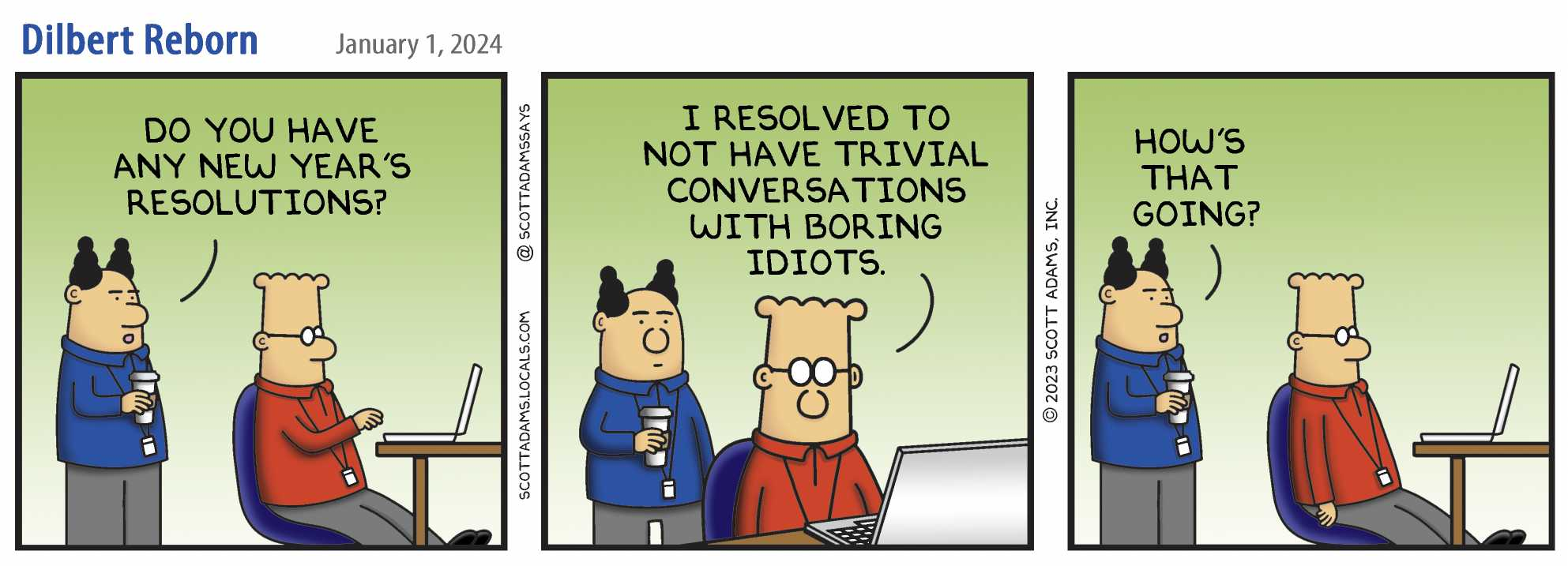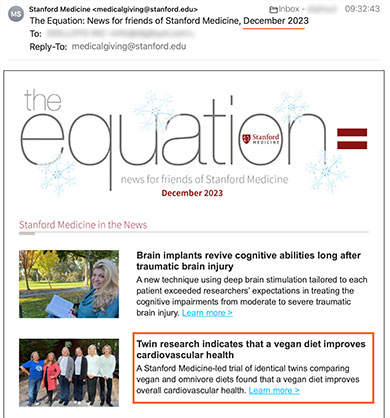Nina Teicholz: “Stanford’s Vegan Twin Study: Science or PR Stunt?” ... “human health is not among priorities”
re: Nina Teicholz
re: ethics in medicine
re: gears of the machine
re: Unsettled Science: Harvard Has Been Anti-Meat for 30+ Years—Why?
Most “scientific” studies are junk, many are fakes/frauds/inherently biased/etc, and the ones that aren’t are often weak or inconclusive. A tiny fraction is left over, that after 50 years or so might ferrret-out some grain of truth.
Science for money is advocacy, if only for one’s career and income. But that’s 99% of what we have today. In that context, real science would use that follow the money incentive to fund equally the opposing viewpoints in any contentious area, letting both sides make their case, with the expectation that both sides would be biased. Nothing like that exists today; it’s all driven by ideological controls.
Not content with being disinformation purveyors (eg the fascist SIO), the nutrition crackpots at Stanford are at it again. But it’s not all bad; some researchers are actually doing good for some people.
Read the puff piece propaganda yourself, with false claims and context-dropping galore... vomit inducing:
Twin research indicates that a vegan diet improves cardiovascular health
Stanford’s Vegan Twin Study: Science or PR Stunt?
2023-12-08. Emphasis added.
Imagine if Cargill Meats launched a center at, say, Dartmouth University, designed to “realize the positive benefits of a carnivore diet” and “identify the animal-based foods to replace plants” for the betterment of all. The initiative is led by a professor who has been a carnivore for 40-plus years and whose most recent study—showing that a carnivore diet prevented heart disease by citing highly selective cholesterol criteria—was funded by a billionaire’s philanthropy devoted entirely to carnivore-related projects. Among them was a hit Netflix film promoting a carnivore diet, to which the billionaire had donated upwards of $1 million. The Dartmouth study publication discloses its foundation grant but says nothing about the philanthropy’s carnivore bias or the fact that the entire Dartmouth center itself is a Cargill Meat venture. (The carnivore professor does, however, report receiving funds from Cargill “outside the submitted work.”)
Surely a media take-down of such industry interference in science would ensue, noting these meat-industry conflicts and the surprising failure to disclose them by the meat-funded scientists.
Indeed, reporters leapt at just such an opportunity in 2019, when Bradley C. Johnston, then of Dalhousie University and lead author on a major set of review papers largely exonerating red meat, failed to disclose a conflict of interest with a food-industry group...
Now press your mental reset button to consider the following facts: Earlier this month, Stanford University professor Christopher Gardner published the results of an eight-week trial on identical twins, purporting to show, based on highly selective criteria, that “the healthy vegan diet led to improved cardiometabolic outcomes compared with a healthy omnivorous diet.” Hence, his recommendation: “Clinicians can consider this dietary approach as a healthy alternative for their patients.”
Gardner, who says he’s been “mostly” vegan for some 40-plus years, happens now to be the director of the Stanford Plant-Based Diet Initiative (PBDI), which was launched in 2021 with a 5-year grant by the meat-replacement company, Beyond Meat.
Funding the twin study itself was the eponymous foundation of Kyle Vogt, a member of the “vegan-mafia,” as some in the media have dubbed it, a group of Silicon Valley tycoons who invest in vegan-focused companies...
... Gardner’s study, published in JAMA Network Open, did not disclose that PBDI is underwritten by Beyond Meat or that the Vogt Foundation is a vehicle for vegan advocacy...
Neither reporters nor academic researchers have shown any interest in PBDI’s conflicts of interest, which have been ongoing since Beyond Meat began funding Gardner’s work in 2018. This disinterest is especially pertinent since Gardner is currently a member of the most powerful expert nutrition group in the country, the U.S. Dietary Guidelines Advisory Committee, which is reviewing the science for the next iteration of the Dietary Guidelines for Americans, our nation’s top nutrition policy. (Gardner even serves on the specific subcommittee (#1) reviewing the saturated-fat caps, which have long been the most effective way to limit meat intake.) Further, Gardner sits on nutrition committees for the American Heart Association.
...Just recently, two Harvard scientists with ties to beer and liquor companies were pulled off a committee on alcohol guidelines, organized by the National Academies of Sciences, Engineering and Medicine, after the New York Times reported on the men’s conflicts of interest. “Many public health researchers were outraged” at the prospect that conflicted researchers would be in charge of official guidelines, the Timesreported. To date, there’s been no similar concern over Gardner.
...Vegan Advocacy Goes to the Movies...
The Science Itself
This view would also help to explain why the study lasted only eight weeks, far too short to establish the longer-term risks and benefits of a vegan diet. All of Gardner’s previous diet trials have been of longer duration... Certainly Gardner knows how to select criteria that will make a vegan diet look better. One could reasonably ask if Gardner, with his vegan funding sources and a Netflix docuseries hanging in the balance, might not be highly motivated for such an outcome... Meals were provided for the first four weeks, and participants were then asked to buy their own food for the second four weeks...
How a Vegan Diet Can Look its Best
Assuring that the vegan diet would at least tie, if not come out ahead in this 8-week comparison required focusing on the sole heart-disease marker that can be expected always to look better on a vegan diet--LDL-cholesterol (LDL-C)--while ignoring or downplaying the rest. This is what the twin study did.... result is not surprising, as all plant-based diets lower the “bad” LDL-cholesterol, largely because plant sterols replace some of the body’s natural cholesterol in the cell walls... cardiovascular health cannot be established from one number alone, let alone how it changes over the course of a mere two months... Plant-based diets also usually lower the “good” HDL-cholesterol...
...A major problem with these two outcomes—weight and fasting insulin--is that neither was listed as an “endpoint” in the original protocol for the trial, submitted to the clinical-trial registry at the National Institutes of Health. If a researcher changes the outcome measures after the study is concluded, as Gardner seemingly did here, there’s a good possibility that this choice reflects cherry picking, meaning the selection of measurements that look good for one’s preferred outcome. The whole point of submitting a protocol in advance is to prevent such post-hoc selection of data.
Basic Nutrition is Boring…but Still Key to Health
...vegans consumed about 64% less vitamin B12 over the course of the study... the very promotion of veganism, a diet that lacks the nutrients to sustain human life, with no historical precedent in human evolution, is ethically questionable as a recommendation for the general population.
Health is Not the Issue
Maximizing metabolic health, however, cannot be considered a priority for either Gardner or his supporters. In a recent interview, Gardner said that becoming vegetarian in 1983 allowed him to align his diet with his “personal values,”...
Gardner says that health is not even a subject of discussion in the course he co-teaches at Stanford on “Food & Society.” Rather, he explains, the focus is on “animal rights and welfare, environment and climate change, human labor abuses in slaughter houses and fast-food restaurants.” This curriculum would be unimpeachable if Gardner were, say, a sociology professor. But he’s not. He’s a professor at the Stanford School of Medicine...
...Gardner says he was inspired by seeing his students get revved up about social justice issues around food...favored a plant-based approach for at least 20 years before even starting his research, meaning his bias was baked in for reasons, by his own reckoning, that were largely unrelated to health...
Gardner has now leaned so far into championing a plant-based diet that his PBDI center can best be understood not as a scientific institute but as the public relations arm of an advocacy agenda.... using non-health related arguments such as animal rights to nudge people towards veganism....
...The fact that human health is not among PBDI’s priorities should ring alarm bells throughout the world of nutrition. The field already suffers from a lack of trust, as Gardner himself pointed out, due to the influence of food and pharma funding. Now, we learn that one of its most prominent scientists has acknowledged that his research on food is principally inspired not by health concerns– hence, fulfilling his obligation as a nutritionist -- but by animal rights, the environment, and labor issues. That this left turn into advocacy has not roused the interest of the media or top public health officials is perhaps because Gardner’s beliefs are aligned with their own. Still, Gardner was right in 2020: we should be troubled by the basic integrity of nutrition science and the obvious financial conflicts of interest present here. Should Stanford support a Beyond-Meat funded advocacy center masquerading as science, and should Gardner be deciding the U.S. Dietary Guidelines for the entire nation? We think not.
WIND: are you starting to see how the gears of the machine work?
You can’t make this stuff up. There is no science here; this is woketard social justice warrior leftist dreck. At Stanford, where it is the norm.
And the trick is... drumroll please... cholesterol levels! Selected as an outcome after the study was complete (eg cherry picking and unscientific). Yes, the crackpot idea that cholesterol is a predictor for health outcomes, an idea which persists among the gullible and trained (like clergy eg doctors) all based on no credible scientific evidence.
These “nutrition experts” are in reality vicious people rationalizing their ideological viewpoint for follow the money reasons, happy to destroy the health of millions with their crackpot claims.
 @AMAZON
@AMAZON









